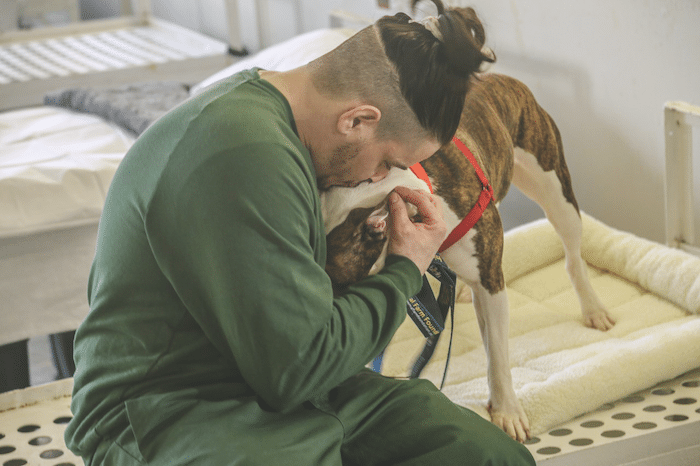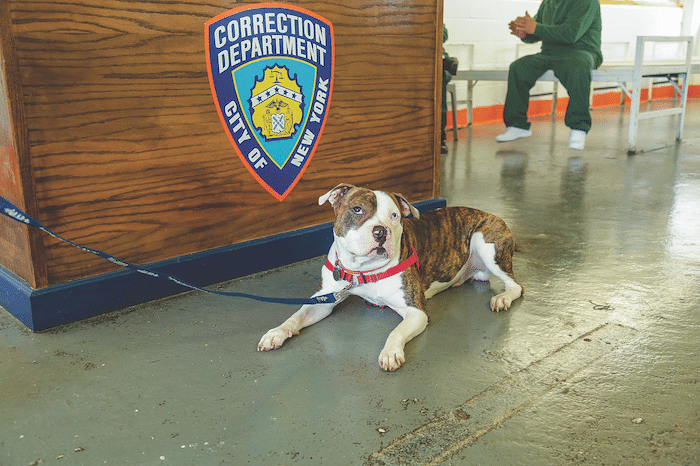The post Ending Breed Discrimination by Lauren Katims appeared first on Dogster. Copying over entire articles infringes on copyright laws. You may not be aware of it, but all of these articles were assigned, contracted and paid for, so they aren’t considered public domain. However, we appreciate that you like the article and would love it if you continued sharing just the first paragraph of an article, then linking out to the rest of the piece on Dogster.com.
For years, Pit Bulls have been a polarizing topic. On one hand, they have a bad rap for being aggressive and dangerous, and have been banned from cities, housing developments and last year, Delta Airlines. On the other hand, there’s a movement to rebrand them as “pibbles,” a nickname created to show a softer — and no doubt trendier — side; a dog fit for a family pet.
In reality, “pit bull” isn’t a breed; it’s a term used to loosely describe American Pit Bull Terriers, American Staffordshire Terriers and Staffordshire Bull Terriers: big head, muscular, stocky body. While pibbles may have a way to go before reaching Doodle status, Pit Bull-type dogs have a growing group of supporters combatting breed specific legislation (BSL), which bans or restricts dogs — most commonly Pit Bulls — because they are perceived to be a threat.
Related: 10 Common Misconceptions About Pit Bulls
One New York-based group, Animal Farm Foundation (AFF), which trains Pit Bulls to be service dogs for people with disabilities, is furthering the cause by offering financial aid to people working to end BSL and the people being affected by it.
“Who is really being discriminated against are the owners,” says Nicole Juchem, AFF manager.

The Paws of Purpose program pairs Pit Bulls with inmates at Rikers Island Correctional Facility, who train the dogs.
A little help
Shelter workers often cite housing bans on specific breeds as one of the top three reasons pets enter the shelter system, according to AFF. This year, the foundation began offering grant money, through its Pet-Accessible Housing Grant, to people and neighborhoods working to change that. The grant funds programs — created by individuals, communities or organizations — that are designed to keep people and pets in their homes. The requirements were intended to be left broad to be as inclusive as possible with funding opportunities, Nicole says.
“It’s open to anyone,” she says. “[It’s about] affecting change in the community.”
Another grant, the Community Impact Grant, is designated for activists fighting against discrimination both at the local or national levels by furthering programs that pair foster dogs with people recovering from addiction, offering reduced or free veterinary services and creating pet accessible domestic violence shelters.
Each dog is an individual
Alongside funding furractive programs, the foundation selects dogs nationwide, mostly from shelters and animal control facilities, to train them for service positions, helping people with disabilities ranging from individuals with hearing loss to others in wheelchairs. After the dogs arrive, the first 30 days are spent getting to know each dog.
“There are some dogs that we can tell in the first few days that they want to be pets and go home on the couch,” says Bernice Clifford, director of behavior and training.
While those dogs go through a more traditional adoption process, the others are put through a series of tests to see how they will react in different settings, such as around farm animals on site and at a local horse sanctuary.
“These dogs have to be excellent in public,” Bernice says. “They have to tolerate all other animals and people.”
The dogs typically train anywhere from six months to a year before being paired with a human. A select few dogs qualify for the foundation’s Detection Dog Grant, where they go through K9 training, learning to detect guns and drugs, and eventually join police forces nationwide.

Some of the dogs that go through Animal Farm Foundation go on to become service dogs.
Paws of Purpose program
Another avenue for those dogs that show they can function in a chaotic environment is to be paired with a select group of inmates at Rikers Island Correctional Facility in the Bronx, who train the dogs under the oversight of a certified professional dog trainer.
“The program is really designed as a human program to help the inmates learn to work with other people,” Bernice says.
Each dog typically has three to five inmates on his team, which is assigned different jobs each week, such as basic obedience training, housetraining, and sitting on the couch and watching TV with the dog, so the dog learns to be calm in a home environment.
Some of those dogs go on to service roles, but the majority get adopted as pets, Bernice says.
#PAWSFORTHISCAUSE: What You Can Do
While the grants have been privately funded, the foundation is now fundraising to further its cause. Go to animalfarmfoundation.org to see how you can get involved.
- Dogs can’t speak up for themselves, so it’s up to you to help: Challenge bans on specific breeds in your community.
- Pit Bulls are the most common dogs in shelters and also have the highest euthanasia rates. Don’t overlook the pibbles in your adoption or fostering quest.
- If you have a Pit Bull, it’s up to you to be a great Pit Bull ambassador. Make sure your dog gets annual training and is socialized well so people see how great your Pit Bull is.
- Keep all dogs — Pit Bull or not — on leash in a public place.
Read Next: Breed-Specific Legislation — What All Dog Owners Need to Know
The post Ending Breed Discrimination by Lauren Katims appeared first on Dogster. Copying over entire articles infringes on copyright laws. You may not be aware of it, but all of these articles were assigned, contracted and paid for, so they aren’t considered public domain. However, we appreciate that you like the article and would love it if you continued sharing just the first paragraph of an article, then linking out to the rest of the piece on Dogster.com.

